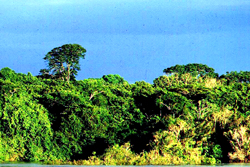Over 100 international experts are expected to gather here next week with the aim of promoting the role of tropical forests and their sustainable management in climate change mitigation and adaptation. The expert meeting is being convened by the Japan-based International Tropical Timber Organization (ITTO), a UN-established inter-governmental agency tasked with promoting the conservation and sustainable management, use and trade of tropical forest resources.
Tropical forests, covering over 1.75 billion hectares of the earth’s surface, have enormous potential to contribute to climate change mitigation and adaptation. Deforestation and forest degradation are estimated to account for up to 18% of current global greenhouse gas emissions. Virtually all these emissions originate in developing tropical countries, most of which are ITTO members. In the five year period to 2005, 15 of ITTO’s tropical member countries accounted for over 70% of total global deforestation, which averaged almost 12 million hectares per year during the period. These countries are where the bulk of policy approaches and positive incentives to reverse the negative impacts of deforestation on climate change will have to be implemented to be effective. Hence, there is an urgent need for the development and implementation of forestry mitigation and adaptation measures and other actions to enhance the carbon balance in tropical forests.
The upcoming expert meeting is expected to clarify and illustrate the role of tropical forest management in climate change adaptation and mitigation, with special focus on the contribution that ITTO can provide to assist its member countries to formulate and implement integrated forest sector responses to climate change. A particular focus of the meeting will be on coordinating emerging requirements of schemes to reduce emissions from deforestation and degradation (REDD), and to promote carbon sequestration through sustainable forest management, taking into account internationally agreed criteria and indicators. Working groups will propose regional strategies that will help to guide climate related initiatives in forestry and that will serve as input to region-specific fora such as the upcoming Fourth Tokyo International Conference on African Development (TICAD IV). This high level gathering, also scheduled in Yokohama a month after the expert meeting, will focus on addressing environmental issues and climate change in Africa as key elements to promote that continent’s economic growth and human security.
For more information on the upcoming international expert meeting, TICAD IV or on ITTO in general, go to www.itto.or.jp.
Spotlight on tropical forests’ climate change role
25 April 2008, YOKOHAMA, JAPAN

A wall of green.
Photo: Fotonatura